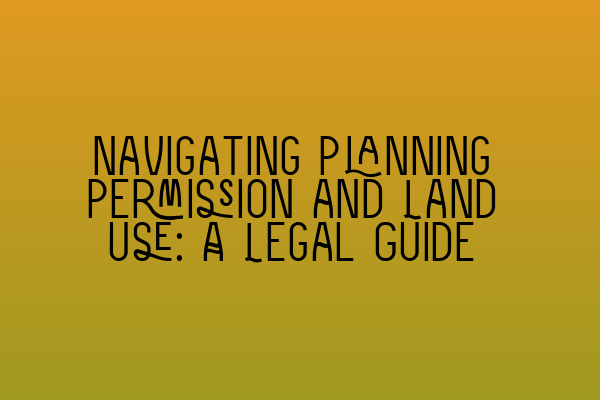Navigating Planning Permission and Land Use: A Legal Guide
Introduction
Planning permission and land use are integral aspects of property law that can have a significant impact on property owners, developers, and local communities alike. Understanding the intricacies of planning permission and land use is crucial for ensuring compliance with regulations, mitigating risks, and achieving successful property development projects. In this comprehensive legal guide, we will delve into the intricacies of planning permission and land use, providing valuable insights for property owners, developers, and legal professionals alike.
Understanding Planning Permission
Planning permission is a crucial legal requirement that must be obtained before starting any new development or change of land use. It is issued by local planning authorities, in accordance with the Town and Country Planning Act 1990, and grants permission for specific types of development in a particular area. Without planning permission, carrying out development activities can lead to enforcement actions, fines, and even demolition orders.
The planning permission process involves submitting an application to the local planning authority, which assesses the proposal against various factors, including the local development plan, environmental impact, and neighborhood considerations. It is important to note that planning permission is not always required, as some development activities may fall under permitted development rights, allowing certain works without the need for formal planning consent.
Key Considerations for Planning Permission
When navigating the planning permission process, it is imperative to consider various key factors to maximize the chances of success and minimize potential complications. Some of these considerations include:
1. Local Development Plan: Familiarize yourself with the local development plan, which outlines the local planning policies and guidelines for land use. Understanding the plan’s objectives and guidelines will provide valuable insights into the likelihood of obtaining planning permission.
2. Environmental Impact Assessment: Depending on the scale and nature of the development, an Environmental Impact Assessment (EIA) may be required. This assessment evaluates the potential environmental effects of a proposed development, including impacts on biodiversity, pollution, and local ecosystems. Conducting an EIA, in collaboration with environmental experts, can help identify potential risks and propose mitigation measures to address these concerns.
3. Community Engagement: Engaging with the local community and stakeholders is essential for securing local support and addressing concerns. Conducting public consultations and providing transparent information about the proposed development can help build goodwill and minimize objections during the planning permission process.
4. Expert Advice: Seeking expert legal advice from solicitors specializing in property law, such as SQE Property Law & Land Law, can provide invaluable guidance throughout the planning permission journey. Qualified solicitors can navigate the complex legal requirements, interpret planning policies, and represent your interests in negotiations and appeals.
Land Use and Zoning Regulations
Land use regulations play a vital role in shaping communities and ensuring proper allocation of resources. These regulations typically involve zoning and designation of land for specific uses, such as residential, commercial, industrial, or agricultural purposes. Understanding land use and zoning regulations is crucial for property development projects and can impact the potential value and profitability of a property.
Zoning regulations vary between different jurisdictions, and it is important to familiarize yourself with the specific regulations governing your area. Some key considerations related to land use and zoning include:
1. Zoning Designations: Familiarize yourself with the different zoning designations within your area. These designations outline the allowable land uses, density limits, building types, setbacks, and other development regulations applicable to specific zones. Understanding these designations will help identify suitable locations for various types of development projects.
2. Compliance with Regulations: When developing a property, it is essential to ensure compliance with all relevant land use regulations. Failure to adhere to zoning regulations can lead to penalties, legal challenges, or even the forced cessation of activities. Engaging a qualified solicitor can help navigate these regulations and ensure compliance.
3. Variance and Conditional Use Permits: In some cases, it may be necessary to seek a variance or conditional use permit to deviate from the established zoning regulations. These permits allow for flexibility and may be granted if the proposed development meets specific criteria or is deemed beneficial to the community. It is important to consult with a solicitor to determine if a variance or conditional use permit is required and to guide you through the application process.
Conclusion
Navigating planning permission and land use can be complex and challenging without the proper understanding of the legal requirements and implications. Obtaining planning permission and complying with land use regulations are integral steps towards successful property development and avoiding potential legal issues. By familiarizing yourself with the intricacies of planning permission, considering key factors, and seeking expert legal advice from professionals like SQE Property Law & Land Law, you can confidently navigate the planning permission process and ensure compliance with land use regulations.
Related Articles:
– SQE 1 Practice Exam Questions
– SQE 1 Practice Mocks FLK1 FLK2
– SQE 2 Preparation Courses
– SQE 1 Preparation Courses
– SRA SQE Exam Dates
